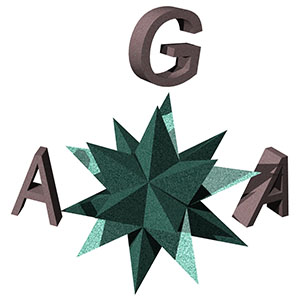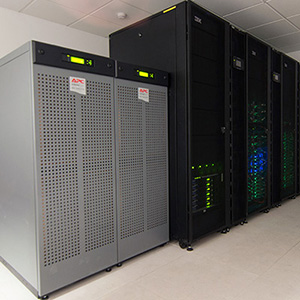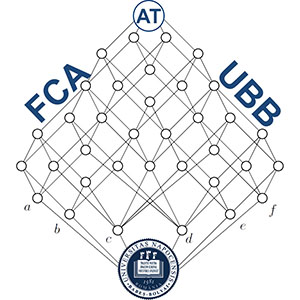Accredited Research Centers & Groups
Accredited Research Centers by the Babeş-Bolyai University
Research Center of Applied Analysis
Our research concentrates on:
- Fixed point and variational methods for nonlinear equations and systems;
- Loewner theory and open problems of univalent functions;
- Nonlinear multicriteria optimization;
- The Poincare problem and periodic solutions for differential systems;
- Geometry of Banach spaces and generalized metric spaces;
- Nonlinear elliptic boundary value problems in Lipschitz domains and different spaces, using methods of potential theory and variational and topological techniques;
- Numerical and approximation methods for nonlinear equations;
- Analysis of some mathematical models from biology and medicine.
Research Center of Groups, Algebras, and Applications

Research directions: Category theory and Homological algebra, Universal algebras and multialgebras, Group graded rings, Hopf algebra actions,Abelian groups and Modules, Representations of finite groups and finite dimensional algebras, Applications of algebra in Coding theory
Research Institute on Artificial Intelligence, Virtual Reality and Robotics
Software Engineering Group
- Program Analysis and Verification: formal mechanisms (such as Session Logic, K-framework) applied to specify and verify different program properties;
- Software Quality: studies related to evaluation and estimation of software quality factors in large applications and in different versions, and their relation to OO metrics;
- Model Driven Engineering: studies related to Executable Models and their specification language (fUML) and their impact on software development;
- Component Based Software Engineering: deals with developing software as a composition of various third party components. Our studies address problems such as: component selection, constraint based configuration of components and different optimizations.
Research directions: Program Analysis and Verification, Software Quality, Model Driven Engineering, Component Based Software Engineering
Research groups on Mathematics accredited by the faculty
Analysis and Optimization Research Group
Geometry Research Group
- The study of some problems involving the functional category of a pair of differentiable manifolds;
- To obtain some formulas of Rodrigues type for Lie groups of matrices with direct applications in geometric mechanics;
- The study of some properties in the generalized geometry;
- New approaches in the study of Blundon’s configurations.
Complex Analysis Research Group
- Loewner chains and the Loewner differential equation in Cn. Analytic and geometric approaches.
- Modern applications of Loewner’s theory and control theory to study of univalent mappings with parametric representation on the unit ball in Cn.
- Variational methods in the study of extremal problems for univalent mappings on the unit ball in Cn.
- Approximation results for families of univalent mappings in Cn.
- Harmonic and pluriharmonic univalent mappings.
- Global injectivity results on finite and infinite dimensional complex Banach spaces.
- Applications of geometric function theory in the study of free boundary problems (Hele-Shaw flows).
Research directions: Complex analysis in one and higher dimensions, Geometric function theory, Loewner theory in Cn, Univalent mappings, Applications of complex analysis in fluid mechanics
Nonlinear Operators and Differential Equations Research Group
- Development of operator methods (Fixed Point Theory, Critical Point Theory, Coincidence Point Theory, Spectral Operator Theory) for equations and system of nonlinear equations;
- Applications of the operator methods for the study of various integral, differential and partial differential equations and systems;
- Poincare problem and periodic solutions for systems of differential equations;
- Banach spaces and generalized metric spaces geometry;
- Real-life applications.
The scientific activity of the research group takes into account institutional and personal international cooperation with researchers from Spain, France, Italy, Russia, Hungary, Serbia, China, Taiwan, Thailand, and so on. An important role of the research group scientific life is the research seminar on Nonlinear Operators and Differential Equations (NODE) which has activities every Thursday from 10.30 to 11.30, in room e, Mathematica building.
Research directions:
- Development of various operator methods for the study of different nonlinear equations and systems of equations, at least from the following perspectives: existence, uniqueness, qualitative properties of the solutions;
- Applications of the abstract operator methods to nonlinear integral, differential and partial differential equations;
- Modelling and simulation for real-life problems from economy, biology, medicine, etc.
Numerical and Stochastic Analysis Research Group
Research directions: Numerical methods, Approximation operators, Computer aided geometric design
Mechanics and Astronomy Research Group
- Nonlinear elliptic boundary value problems in fluid mechanics based on potential theory, variational methods, and topological methods.
- Boundary value problems on domains with low regularity in the n-dimensional Euclidean setting or compact Riemannian manifolds.
- Partial differential equations, boundary integral equations, integro-differential equations, and their applications in fluid mechanics.
- Pseudodifferential elliptic operators.
- Applications of complex analysis in fluid mechanics.
- Numerical analysis in fluid mechanics and heat and mass transfer theory.
- Dynamical systems in celestial mechanics and astrononmy.
Research directions: Potential theory, Fluid mechanics, Partial differential equations, Computational analysis, Celestial mechanics
Research groups on Computer Science accredited by the faculty
Research group on Machine Learning
Research directions: Supervised, unsupervised and reinforcement learning, Hybrid and dynamic machine learning models, Relational association rule mining, Search-based software engineering, Applications of machine learning in various domains, like: software engineering, bioinformatics and computational biology, bioarchaeology, computer vision, natural language processing, social media, etc.
Distributed Systems and Web Communication Research Group
High Performance Interdisciplinary Applications Research Group
 The “High Performance Interdisciplinary Applications” research group functions within the Center of Modeling, Optimization and Simulation (MOS) and targets fundamental research for interdisciplinary application domains. Using HPC-UBB infrastructure capable of 40TFlops Rmax, the research includes modeling and simulation of different natural phenomena, optimization, visualization, data analysis, parallel and distributed programming, big data analytics, and high performance computing.
The “High Performance Interdisciplinary Applications” research group functions within the Center of Modeling, Optimization and Simulation (MOS) and targets fundamental research for interdisciplinary application domains. Using HPC-UBB infrastructure capable of 40TFlops Rmax, the research includes modeling and simulation of different natural phenomena, optimization, visualization, data analysis, parallel and distributed programming, big data analytics, and high performance computing.
Research directions: Distributed and parallel programming, Models optimization, Simulation and visualization, Image processing and virtual reality, Big Data Analytics, Numerical and statistical simulations
Formal Concept Analysis Research Group
 Formal concept analysis (FCA) is a prominent data analysis method for extracting, processing and knowledge representation. We are interested (but not restricted to) the following topics:
Formal concept analysis (FCA) is a prominent data analysis method for extracting, processing and knowledge representation. We are interested (but not restricted to) the following topics:
- Theory development: Triadic and temporal FCA (3FCA, TCA);
- Applications: weblog analysis, business intelligence, using VR and AR to visualize conceptual structures.
Research directions: Formal Concept Analysis and Applications
Metaheuristics for Complex Systems Research Group
Modeling, Optimization and Simulation Research Group (MOS)
Research group TESTUM
The group investigates research problems at the intersection of Software Testing, Software Metrics, Software Teams, Software Project Management, Artificial Intelligence and Computer Science Education (learning/teaching).








